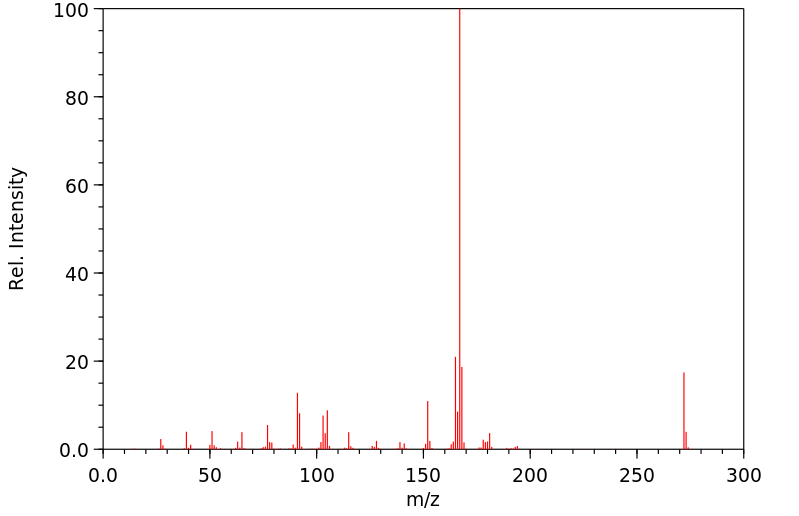1,1,3-三苯基丙烷 | 19120-39-9
分子结构分类
中文名称
1,1,3-三苯基丙烷
中文别名
——
英文名称
propane-1,1,3-triyltribenzene
英文别名
1,1,3-triphenylpropane;1,1,3-Triphenyl-propan;1,3-diphenylpropylbenzene
CAS
19120-39-9
化学式
C21H20
mdl
——
分子量
272.39
InChiKey
NNUULSMRBTWJKR-UHFFFAOYSA-N
BEILSTEIN
——
EINECS
——
-
物化性质
-
计算性质
-
ADMET
-
安全信息
-
SDS
-
制备方法与用途
-
上下游信息
-
文献信息
-
表征谱图
-
同类化合物
-
相关功能分类
-
相关结构分类
计算性质
-
辛醇/水分配系数(LogP):6.1
-
重原子数:21
-
可旋转键数:5
-
环数:3.0
-
sp3杂化的碳原子比例:0.14
-
拓扑面积:0
-
氢给体数:0
-
氢受体数:0
安全信息
-
海关编码:2902909090
SDS
上下游信息
-
上游原料
中文名称 英文名称 CAS号 化学式 分子量 —— 1,1,3-triphenylpropan-1-ol 6880-25-7 C21H20O 288.389
反应信息
-
作为产物:描述:参考文献:名称:Wieland; Kloss, Justus Liebigs Annalen der Chemie, 1929, vol. 470, p. 216摘要:DOI:
文献信息
-
Radical induced disproportionation of alcohols assisted by iodide under acidic conditions作者:Yang Peng、Yang Huang、Teng Li、Nianxin Rong、Haiwei Jiang、Hexian Shi、Weiran YangDOI:10.1039/d1gc01850g日期:——The disproportionation of alcohols without an additional reductant and oxidant to simultaneously form alkanes and aldehydes/ketones represents an atom-economical transformation. However, only limited methodologies have been reported, and they suffer from a narrow substrate scope or harsh reaction conditions. Herein, we report that alcohol disproportionation can proceed with high efficiency catalyzed
-
Potassium‐Zincate‐Catalyzed Benzylic C−H Bond Addition of Diarylmethanes to Styrenes作者:Yu‐Feng Liu、Dan‐Dan Zhai、Xiang‐Yu Zhang、Bing‐Tao GuanDOI:10.1002/anie.201713165日期:2018.7.2for the synthesis of diarylmethine‐containing compounds. However, the methods developed to date for this purpose require a stoichiometric amount (usually more) of either a strong base or an oxidant. Reported here is the first catalytic benzylic C−H bond addition of diarylmethanes to styrenes and conjugated dienes. A potassium zincate complex, generated from potassium benzyl and zinc amide, acts as
-
Dimeric Metal Complexes as Mediators for Radical C?C Bond-Forming Reactions作者:Bernd Giese、Gebhard ThomaDOI:10.1002/hlca.19910740523日期:1991.8.7(2) in the presence of alkyl halides leads to C-centered radicals which can be trappedby alkenes and yields saturated and/or unsaturated addition products. Carbon radicals are generated via halogen abstraction by the initially formed metal-centered radicals resulting from homolysis of the metal-metal bond of dimeric mediators 1 and 2. No reaction occurs using octacarbonyldicobalt (3).
-
Substituted Hantzsch Esters as Versatile Radical Reservoirs in Photoredox Reactions作者:Fangjun Gu、Wenhao Huang、Xu Liu、Wenxin Chen、Xu ChengDOI:10.1002/adsc.201701348日期:2018.3.1Substituted Hantzsch esters can act as radical reservoirs in photoredox reactions, steadily releasing a carbon radical and a hydrogen atom radical in the absence of an additional electron acceptor. We propose that radical release by substituted Hantzsch esters occurs via a mechanism involving an internal redox cycle. Cinnamidecinnamides, styrenes, α,β‐unsaturated acids, and diarylethenes could be alkylated
-
Oxo-Rhenium-Catalyzed Radical Addition of Benzylic Alcohols to Olefins作者:Chandrasekhar Bandari、Kenneth M. NicholasDOI:10.1021/acs.joc.9b03150日期:2020.3.6Although carbon radicals generated from a variety of alcohol derivatives have proven valuable in coupling and addition reactions, the direct use of alcohols as synthetically useful radical sources is less known. In this report, benzylic alcohols are shown to be effective radical precursors for addition reactions to alkenes when treated with triphenylphosphine or piperidine with the catalyst ReIO2(PPh3)2 (I)
表征谱图
-
氢谱1HNMR
-
质谱MS
-
碳谱13CNMR
-
红外IR
-
拉曼Raman
-
峰位数据
-
峰位匹配
-
表征信息
同类化合物
(2Z)-1,3-二苯基-2-丙烯-1-酮,2-丙烯-1-酮,1,3-二苯基-,(2Z)-
龙血素D
龙血素A
龙血素 B
黄色当归醇F
黄色当归醇B
黄腐醇; 黄腐酚
黄腐醇 D; 黄腐酚 D
黄腐酚B
黄腐酚
黄腐酚
黄卡瓦胡椒素 C
高紫柳查尔酮
阿普非农
阿司巴汀
阿伏苯宗
金鸡菊查耳酮
邻肉桂酰苯甲酸
达泊西汀杂质25
豆蔻明
补骨脂色烯查耳酮
补骨脂查耳酮
补骨脂呋喃查耳酮
补骨脂乙素
蜡菊亭; 4,2',4'-三羟基-6'-甲氧基查耳酮
苯酚,4-[3-(2-羟基苯基)-1-苯基丙基]-2-(3-苯基丙基)-
苯磺酰胺,N-[4-[3-(3-羟基苯基)-1-羰基-2-丙烯基]苯基]-
苯磺酰胺,N-[3-[3-(4-羟基-3-甲氧苯基)-1-羰基-2-丙烯基]苯基]-
苯磺酰胺,4-甲氧基-N,N-二甲基-2-(3-羰基-3-苯基-1-丙烯基)-,(E)-
苯磺酰氯化,4,5-二甲氧基-2-(3-羰基-3-苯基-1-丙烯基)-,(E)-
苯磺酰氯,4-甲氧基-3-(3-羰基-3-苯基-1-丙烯基)-,(E)-
苯甲醇,4-甲氧基-a-[2-(4-甲氧苯基)乙烯基]-
苯甲酸-[4-(3-氧代-3-苯基-丙烯基)-苯胺]
苯甲酸,3-[3-(4-溴苯基)-1-羰基-2-丙烯基]-4-羟基-
苯甲酰(2-羟基苯酰)甲烷
苯甲腈,4-(1-羟基-3-羰基-3-苯基丙基)-
苯基[2-(1-萘基)乙烯基]甲酮
苯基-(三苯基-丙-2-炔基)-醚
苯基-(2-苯基-2,3-二氢-苯并噻唑-2-基)-甲酮
苯亚甲基苯乙酮
苯乙酰腈,a-(1-氨基-2-苯基亚乙基)-
苯丙酸,a-苯甲酰-b-羰基-,苯基(苯基亚甲基)酰肼
苯,1-(2,2-二甲基-3-苯基丙基)-2-甲基-
苏木查耳酮
苄桂哌酯
苄基(4-氯-2-(3-氧代-1,3-二苯基丙基)苯基)氨基甲酸酯
芦荟提取物
腈苯唑
胀果甘草宁C
聚磷酸根皮酚







